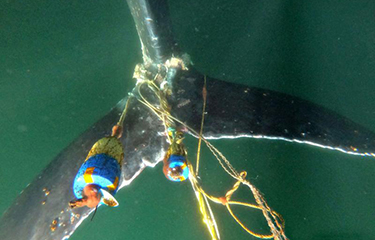Conservation groups want NOAA Fisheries to ban imports from foreign fisheries that are not adequately working to prevent marine mammal bycatch.
“By continuing to allow imports that do not meet U.S. standards, [NOAA Fisheries] NMFS chooses business as usual over the survival of some of the most amazing species on the planet,” Natural Resources Defense Council (NRDC) Senior Attorney and Global Biodiversity Conservation Director Zak Smith said. “Because NMFS has failed to safeguard ocean biodiversity, future generations may never have the chance to protect invaluable marine life.”
A report jointly produced by the Center for Biological Diversity, NRDC, Animal Welfare Institute, and the Environmental Investigation Agency found that 11 nations have at least some fisheries that don’t meet U.S. standards for preventing whale and dolphin bycatch.
“We found that some foreign fisheries are doing almost nothing to monitor or prevent marine mammal bycatch, and U.S. officials must follow the law and block certain seafood imports linked to deadly entanglements,” Center for Biological Diversity Staff Scientist Dianne DuBois said. “U.S. fishers have made big changes to reduce the killing of whales and dolphins. It’s time for other nations to step up. This is a chance for the huge U.S. seafood market to help save marine mammals around the world.”
The countries included in the report are Canada, Ecuador, Fiji, France, India, Indonesia, Mexico, Norway, South Africa, South Korea, and the United Kingdom, although the conservation groups said it is likely that other nations would also violate U.S. standards.
The report follows NOAA Fisheries’ announcement in October that it would be further delaying enforcement of a 2016 rule requiring the U.S. government to ban seafood imports from foreign wild-caught fisheries that don’t have marine mammal protections comparable to those enforced in United States’ domestic fisheries. Nations will be exempt from the rule until 2026. NOAA Fisheries claims it needs the additional time to process the 134 applications it’s received covering 2,500 foreign fisheries.
The agency’s decision was criticized by the conservation groups.
“For decades, U.S. consumers have made it clear that they do not wish to buy seafood caught using methods that result in the suffering and death of marine mammals,” Animal Welfare Institute’s Marine Life Program Senior Policy Consultant Kate O’Connell said. “NMFS’ job is to ensure that all commercial fishing operations exporting seafood to the United States comply with federal standards, and yet the agency keeps breaking its own deadlines.”
“This U.S. law provides a once-in-a-lifetime opportunity to prevent many thousands of these deaths, and we simply can’t afford to wait any longer,” Environmental Investigation Agency UK Senior Ocean Campaigner Sarah Dolman said.
Photo courtesy of NOAA Fisheries/West Coast Large Whale Entanglement Response Program







